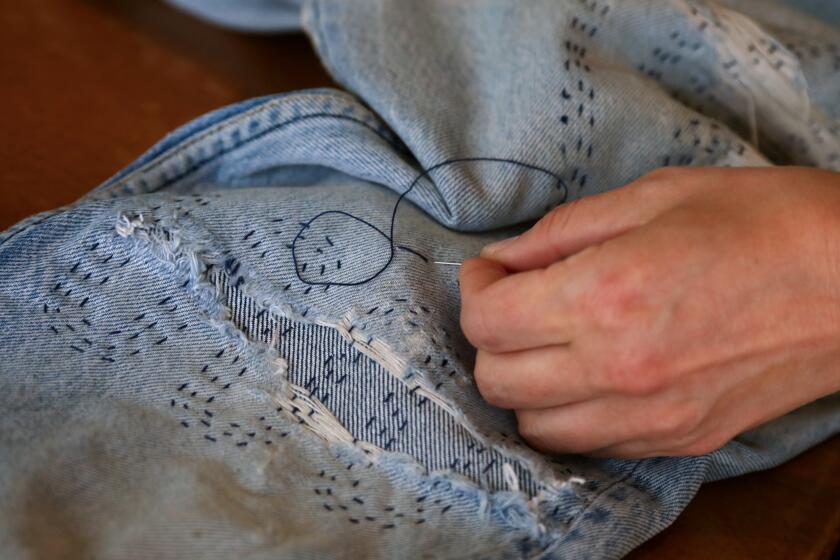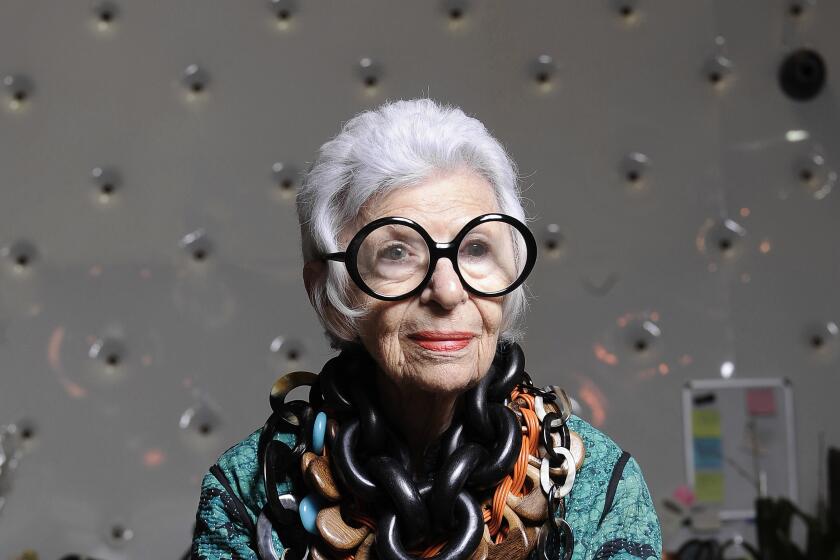Shop Around the Clock
By 1:30 a.m. the number of customers at the only 24-hour Good Guys store has dropped off dramatically. There’s a ledge of time only hard-core retail vampires choose to leap. One moment there are dozens of shoppers, the next only six or seven wandering past the “toys and distractions,” as one salesman calls the TVs, cameras, phones, computers, boomboxes and stereos.
“After 1 a.m. is a nebulous time,” says James Johnston, who walked to the store in the Beverly Connection mall on La Cienega Boulevard at 2 a.m. He came just to browse. Though he comes here often, he’s never purchased more than videotapes.
He stops to play “Acqueous Major,” a CD video shoot-fly-crash game on the Panasonic 3DO machine. Ted Kim, one of the salesmen, coaches him on technique. There are maybe five customers in the store.
“There’s something about shopping late at night,” says Johnston. “It’s exclusive. You have the inside track. It’s like being in a place after closing and having the run of it.”
As Johnston’s electronic fighter aircraft twists and turns, Kim, 24, offers occasional advice. There is no sales pressure. The store has become an all-night video game clinic.
This easy-going relationship between browsing customer and un-harried salesperson happens again and again. It’s a distinctly L.A. late-night scene, quiet and mellow. It stands in contrast to New York’s intense and jittery version.
The staff working the four-day-a-week 10 p.m. to 10 a.m. shift is also very L.A. in the ‘90s.
Night manager Enamul Apu is a Muslim from Bangladesh. This summer he’s going back home for a traditional arranged marriage. David Davis was once a tour manager with Smokey Robinson. Michael Pittman is a music composer; Stephen Ingle, a stand-up comedian. Shone Harris is a runway model. And actor John Belche has the recurring part of Al the bartender on “Days of Our Lives.”
As for the customers, it can be safely said that anyone who shops for a computer printer at 2:30 a.m. is a night owl. There are police officers, club-goers, homeless people, swing-shift workers, movie industry types, the occasional celebrity (the night staff says Ringo Starr, Dwight Yoakam and David Bowie have all been in), insomniacs, housewives who apologize for shopping so late (“I don’t usually do things like this”) and guys who bring dates and get teased by the staff about being cheap.
Writer Mikal Gilmore, self-described as “quite nocturnal,” is shopping for stereo speakers in the wee hours. He tells of once watching a man keep a taxi waiting while he bought a speaker wire at 3 a.m. The customer was “blissed out, laughing at the TVs and basically scaring the hell out of people,” says Gilmore.
The staff tells of a Japanese tour bus full of shoppers pulling up at 5 a.m. They remember “the dog lady” who for months used the store’s bathroom with her poodle every night at 3. And Apu is surely the only Bangladeshi to sell a cordless telephone to a Playboy Playmate of the Year by the dawn’s early light.
Ingle, who at 2:45 a.m. is tidying the shelves, divides the customers into two groups. “They’re either fully focused on what they’re doing,” he says. “Or they’re killing time.”
For the fully focused, this is a perfect time to shop. Never in a consumer’s dreams could they get so much attention. There are moments at 3 a.m. when the salesmen are like fervid missionaries preaching to a congregation of one. Here the sermons are on TV picture tubes or the THX Surround Sound system. “In the day it can be like an assembly line,” says Pittman. “At night, it’s a relationship.”
“Break the ice and build rapport,” Kim says, mantra-like. Talk to the browsers. Be friendly. “It’s not like in the daytime,” Kim says. “They remember you. They come back.”
The salesmen seem almost grateful for the distraction from the tedium. “This late at night,” says Ingle, “it’s not fast-food electronics.”
At 3:30, three of the sales staff leave for lunch. Only night-shift workers could rattle off a complete list of nearby 24-hour dining options. Their favorite is the Beverly Hills Cafe; plus there’s Ships, Norm’s, the International House of Pancakes, Larry Parker’s, Fatburger, Ben Frank’s, Canter’s and, the choice for this night, the recently opened Jerry’s Famous Deli, a block away.
When the salesmen return after 4, the store is in the doldrums. Though never without at least one customer, at this hour the store rarely gets above single digits.
It’s now that the salesmen change prices, discount returned items and amuse themselves by hooking the Panasonic 3DO ($700) to the Mitsubishi 120-inch TV ($15,000) and playing a “Total Eclipse” video game ($50).
“It rocks,” says Ingle of playing on the wall-size TV.
“It more than rocks,” says Kim. “It rules.”
It’s 5:30 a.m. There is one customer in the store, Jeff Catarino, a designer who’s wearing a yellow Walkman as he looks for a two-line phone and a stereo.
Catarino has bought lots of electronic equipment here and the staff recognizes him. He walks through the store completely absorbed in the music on his Walkman, and the merchandise.
He removes the Walkman earplugs only once, when he’s asked what would lead a person to price phones at this hour of the morning. With a slightly incredulous look, he takes the headphone out of one ear and says, “It’s just a great time to go shopping.”
As the Elton John/RuPaul video plays on 150 TV screens behind him and dawn breaks over La Cienega Boulevard, he goes back to fiddling with the knobs on an Aiwa stereo.






